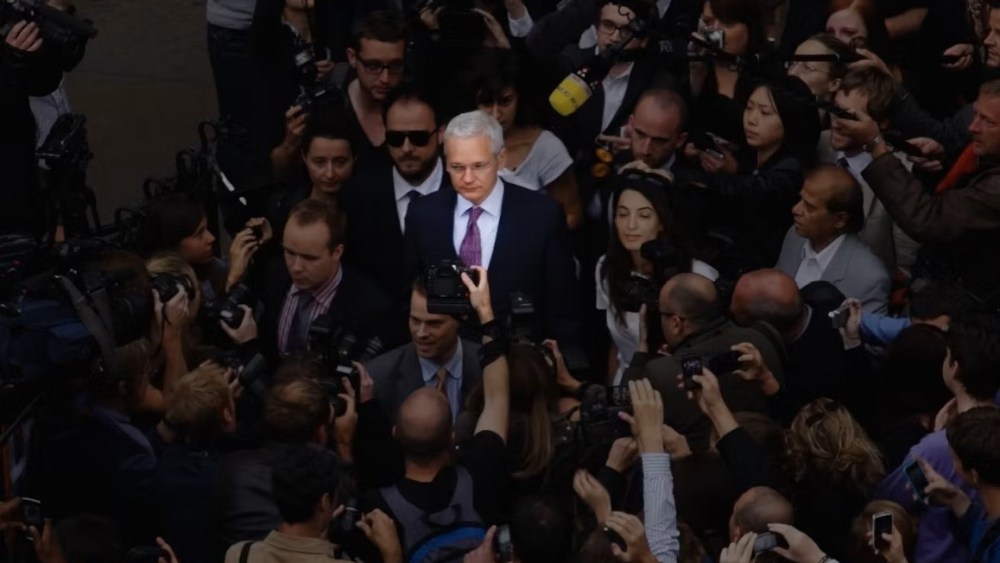Journalists and filmmakers and cinema itself are facing growing political threats and increasing difficulties, according to film industry reps at the Zurich Summit on Saturday.
Taking part in a discussion on the political turmoil engulfing the entertainment industry at the Zurich Film Festival industry event were Kathleen Fournier of Charlotte Street Films, producer of the Julian Assange doc “The Six Billion Dollar Man;” David Unger, CEO of Artist International Group; Nathanaël Karmitz, chairman of Paris-based MK2; and Stephen Follows, film data researcher and consultant for Guinness World Records.
Offering a stark example of the darkening climate for filmmakers was Fournier’s experience in producing Eugene Jarecki’s “The Six Billion Dollar Man,” which screens at the Zurich Film Festival.
“As a filmmaker, as a producer, there is substantial risk sometimes involved for me and my team personally,” Fournier said, explaining how she moved with her family to Berlin to work on the documentary, which tells “the definitive story of Wikileaks,” due to the potentially explosive footage they had obtained.
“We didn’t feel comfortable editing in the U.K. or in the U.S. because there are laws there and ways to seize footage, and journalists aren’t protected in the way they are in Germany. So we moved the entire production and editing team to Berlin, and that was really inspiring and very interesting … until Gaza happened and we started to see that even Germany, with all of its civic mindedness, is fallible to ideology and to erosion. So it was very interesting to see journalists challenged there in real time and to react to that.”
She added: “I think we really do need a mechanism in place to protect journalists. And that’s what our film is about.”
Fournier also noted how the changing political climate and growth of streaming platforms have impacted the prospects of certain types of documentaries.
“It used to be that if you won an Emmy, won the Sundance Grand Jury prize, won a Grierson Award, you would have no trouble getting your films made. And we won all of those with many of our films. I’m not complaining that doors have closed, but what I’m seeing is that as documentaries move to streaming platforms, many of the political and more nuanced and difficult or subjective documentaries did not make that leap.
“The sort of documentaries you now find on streaming platforms tend to be historical – there’s the past, so it flattens the stakes in a way because those people are gone, that time is finished – or it’s true crime or it’s often very sort of personal stories. So it is interesting trying to make a film at this particular juncture as the media landscape is changing fundamentally, dramatically.”
Yet life has always been difficult, Fournier added. “Every epoch has its challenges, and I think we as a generation, my generation, inherited a lot of the fruits of other people’s labor in the civil rights movement, in terms of civil liberties. Now it’s up to us to stand up for those and really investigate what it means as some of those rights and liberties get challenged or taken away.”
Despite winning this year’s Golden Eye Special Jury Prize at Cannes and a “phenomenal” screening in Zurich, “The Six Billion Dollar Man” has yet to land a U.S. distributor.
“We’ve been dancing with lots of partners and talking. People love the film, but it’s a difficult film. … It talks about Trump, it talks about the deep state. It uses all the facts that come from various court cases. It’s an incredibly, deeply researched film.”
Offering a sharp critique of the industry, Follows argued that the onus was on companies to exhibit greater courage, as was the case in the 1970s, which saw much braver, more diverse and interesting storytelling than what was produced in subsequent decades.
“The film industry is fundamentally, as a business and as an ecosystem, risk averse and scared and cowardly. … It’s absolutely cowardly that they’re not releasing these films. You think about how ‘Bowling for Columbine’ got media releases and things like that. So this needs agitators. If we leave it and don’t actively do things, the industry acts in horrible ways. The reason Me Too had to happen is because when left to our own devices as an industry, we didn’t police, we didn’t sort out.”
While stressing that politics and cinema have always been very linked, Karmitz said: “What is new is that we ask this question, and we ask this type of question because culture is under attack and cinema is under attack.”
Karmitz said that while the press was talking less and less about films, far-right accounts on the social media platform X were systematically attacking “everything about movies and French movies.”
The far-right has become the major voice discussing cinema on X, he added. “Is this a problem? Yes, it is, because the question is, how do we organize to fight back?”
Karmitz noted that many of MK2’s cinema events and discussions attract contentious reactions from far-right critics.
Looking at the broader situation in France, he also stressed the recent legal challenge faced by the CNC national film center in Parliament and the ongoing right-wing assault on national television.
Unger, for his part, expressed optimism that the climate would eventually improve. He recalled how earlier films by the likes of Charlie Chaplin and Stanley Kramer “were unbelievably controversial” in their day. Kramer’s 1967 classic “Guess Who’s Coming to Dinner,” for example, no longer causes the great ruckus it once did.
He also underscored the importance of such a discussion at the Zurich Summit. “I see that this register’s here. And I think for us to have this dialogue here is important, because it’s forcing all of us in this room to kind of examine where the business is and how we can help shape it.”

